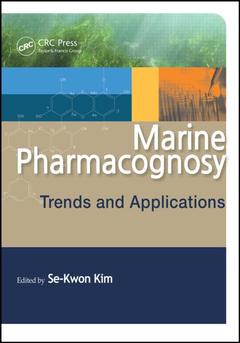Description
Marine Pharmacognosy
Trends and Applications
Coordinator: Kim Se-Kwon
Language: English
Subjects for Marine Pharmacognosy:
Keywords
Marine Algae; Marine Natural Products; Past; Present; and Future of Marine Pharmacognosy; Brown Alga; Bioactive Secondary Metabolites from Marine-Derived Fungi; IC50 Value; Marine Natural Products Targeting Nuclear Factor κB; Marine Sponge; Alkaloids as Pharmaceutical Agents from Marine Fungi; Domoic Acid; Allergy and its Remedies from Marine Sources; Brown Marine Algae; NF κB Activation; Sulfated Polysaccharides; AGS Cell; Dolastatin; Fucus Vesiculosus; Marine Actinobacteria; Marine Organisms; EC; Bioactive Peptides; Cryptophycin-1; Marine Fungi; Actinobacterial Species; Tamil Nadu; Nonribosomal Peptide Synthetases; NRPSs; Marine Cyanobacteria; NFATc1; Okadaic Acid
Support: Print on demand
Description
/li>Contents
/li>Biography
/li>
Diverse and abundant, marine-derived bioactive compounds offer a plethora of pharmacologically active agents with the potential to produce valuable therapeutic entities. Marine-derived organisms, including some macroalgae, microalgae, blue-green algae, invertebrates, and vertebrates?valued in traditional Chinese medicine since ancient times?are now recognized as rich sources of pharmaceutically active compounds. These factors, coupled with the growing need for novel bioactives for the treatment of severe human diseases such as cancer, diabetes, microbial infections, and inflammatory processes, has brought marine pharmaceuticals to the forefront of pharmacology.
Marine Pharmacognosy: Trends and Applications provides a comprehensive account of marine-derived bioactive pharmaceuticals and their potential health benefits, including antioxidant, anticancer, antiviral, anticoagulant, antidiabetic, antiallergy, anti-inflammatory, antihypertensive, antibacterial, and radioprotective activities. Moreover, it discusses the sources, isolation and purification, chemistry, functionality interactions, applications, and industrial features of a variety of marine-derived pharmaceuticals.
Marine pharmacognosy is a dynamic field that has been systematically investigated over the last 50 years, and the number of publications and patents are increasing every year. Bringing together a global team of experts, Marine Pharmacognosy: Trends and Applications reviews current research on marine-derived bioactive compounds and provides insight into future research on their potential as pharmacologically active agents.
Past, Present, and Future of Marine Pharmacognosy. Antidiabetic Compounds from Marine Organisms and Their Properties. Bioactive Compounds from Okinawan Marine Cyanobacteria. Bioactive Secondary Metabolites from Marine-Derived Fungi. Cytotoxic Briarane-Type Diterpenoids. Pharmacoanalytical Procedures for Chondroitin Present in Raw Materials and Biological Fluids. Marine Natural Products Targeting Nuclear Factor κB. The Immunomodulatory Effect of Marine Algae on Allergic Response. Pharmacological Effects of Marine-Derived Bioactive Peptides. Sea Cucumber Saponins: Realization of Their Anticancer Effects. Antibacterial Effect of Phlorotannins from Marine Brown Algae. Bioactive Molecules from Symbiotic Marine Dinoflagellates. Pharmacological Potential of Phlorotannins from Marine Brown Algae. Microalgae as Sources of Biomaterials and Pharmaceuticals. Marine Ascidians: A Promising Resource for Bioactive Compounds. Chitosan and Its Derivatives for Treatment of Diabetic Complications. Alkaloids as Pharmaceutical Agents from Marine Fungi. Pharmacological Effects and Prospects of Marine Algae in Promoting Women’s Health and Longevity. Marine Sponge-Associated Microbes: A Source of Biologically Active Metabolites. Marine Actinobacteria: A Potential Source for Antifungal Compounds. Marine Drugs: Treatment for Osteoporosis and Related Bone Diseases. Bioactive Compounds from Marine Sources on Gastrointestinal Cancer Treatment. Marine Algae: Pharmacological Values and Anti-Inflammatory Effects. Marine Microbial Pharmacognosy: Aspects and Prospects. Pharmacognosy Prospects of Marine Algal Derivatives in the Management of Skin Inflammation. Antidiabetic Effect of Dieckol, A Marine Polyphenol, and Its Mechanisms of Blood Glucose Regulation. Allergy and its Remedies from Marine Sources. Anticancer Mechanisms of Actin Depolymerization Agent Pectenotoxin-2. A Prospective Cosmetic and Pharmaceutical: Marine Mucin. Neuropsychopharmacological Properties of Marine Plants. Antiparasitic Secondary Metabolites from Marine Actinobacteria. Pharmaceutical Aspect of Metabolites from Marine Algae on Skin Health. Clues for Cancer from Ocean-Derived Molecules and Role of In Silico Techniques in Anticancer Drug Discovery. Anticancer Compounds from Marine Microorganisms.
Se-Kwon Kim is a Professor at Department of Chemistry and Director of Marine Bioprocess Research Center at Pukyong National University, Busan, South Korea.




